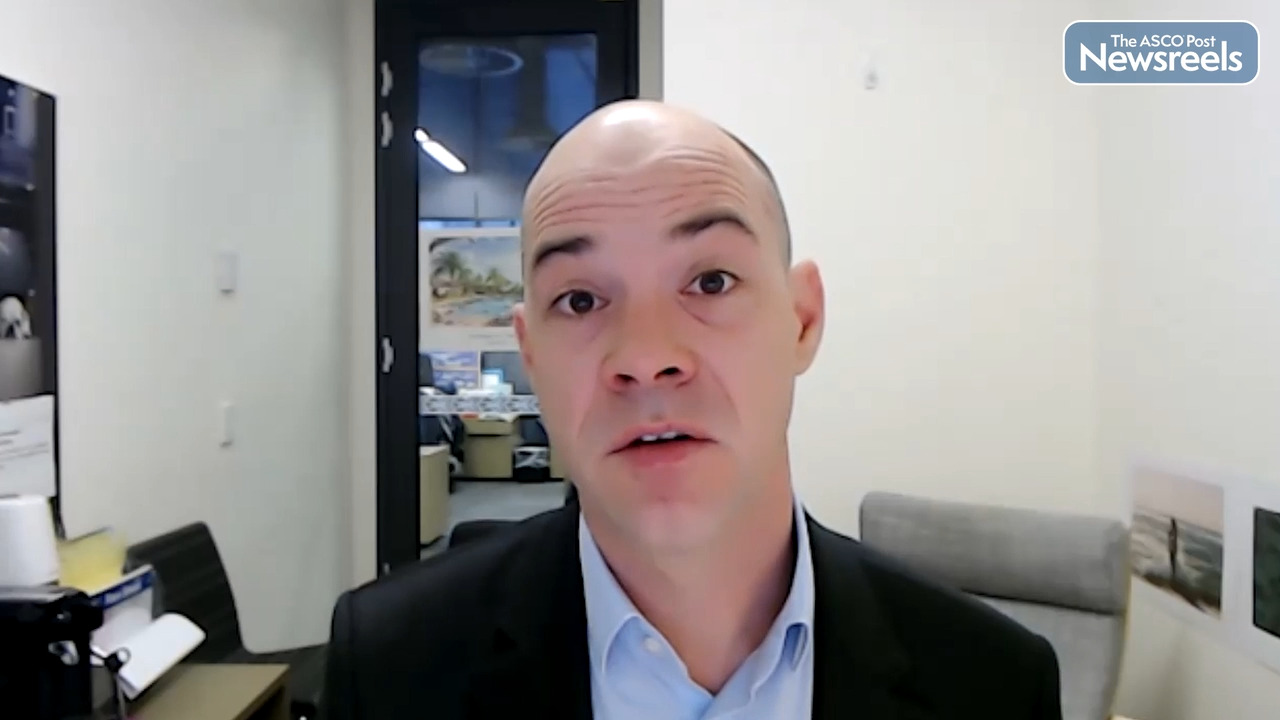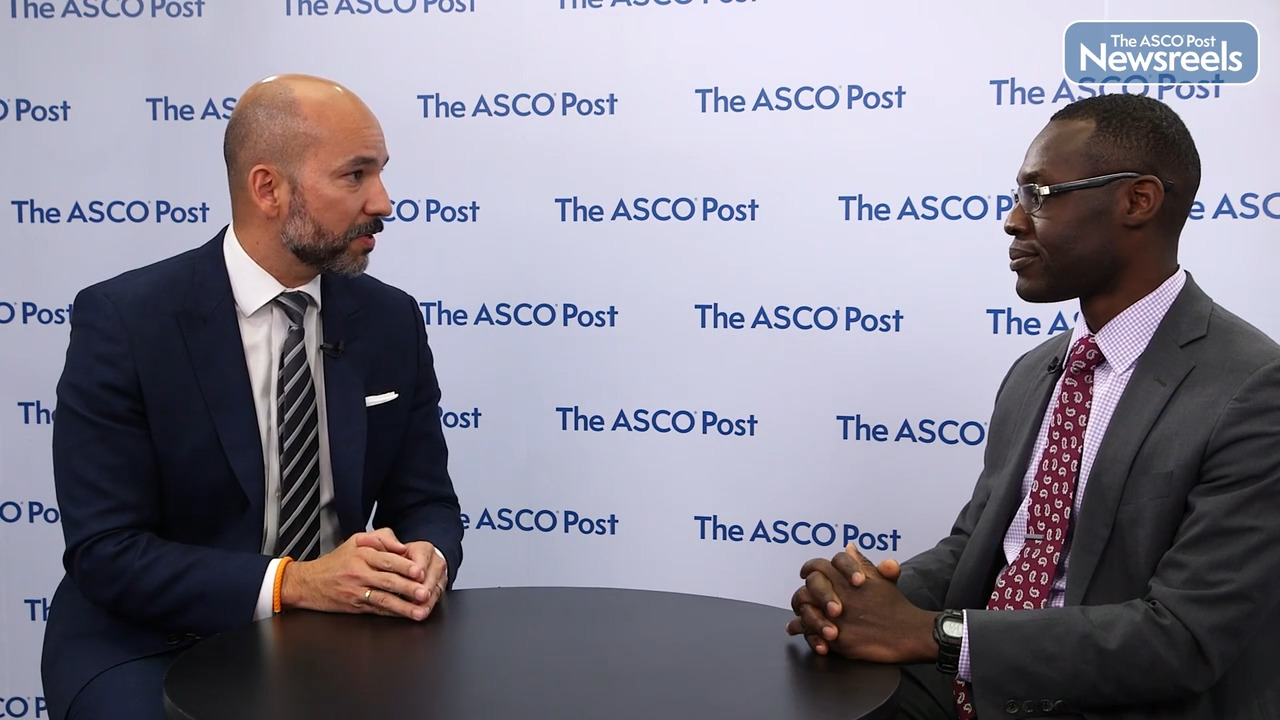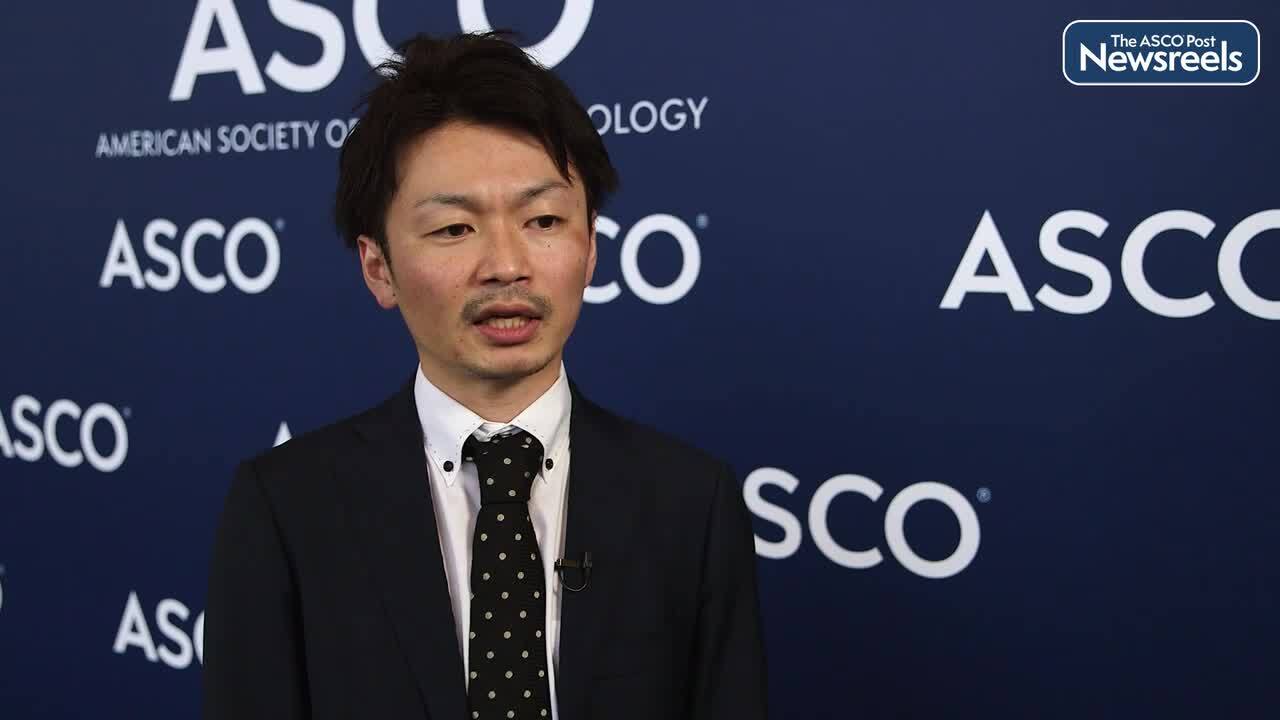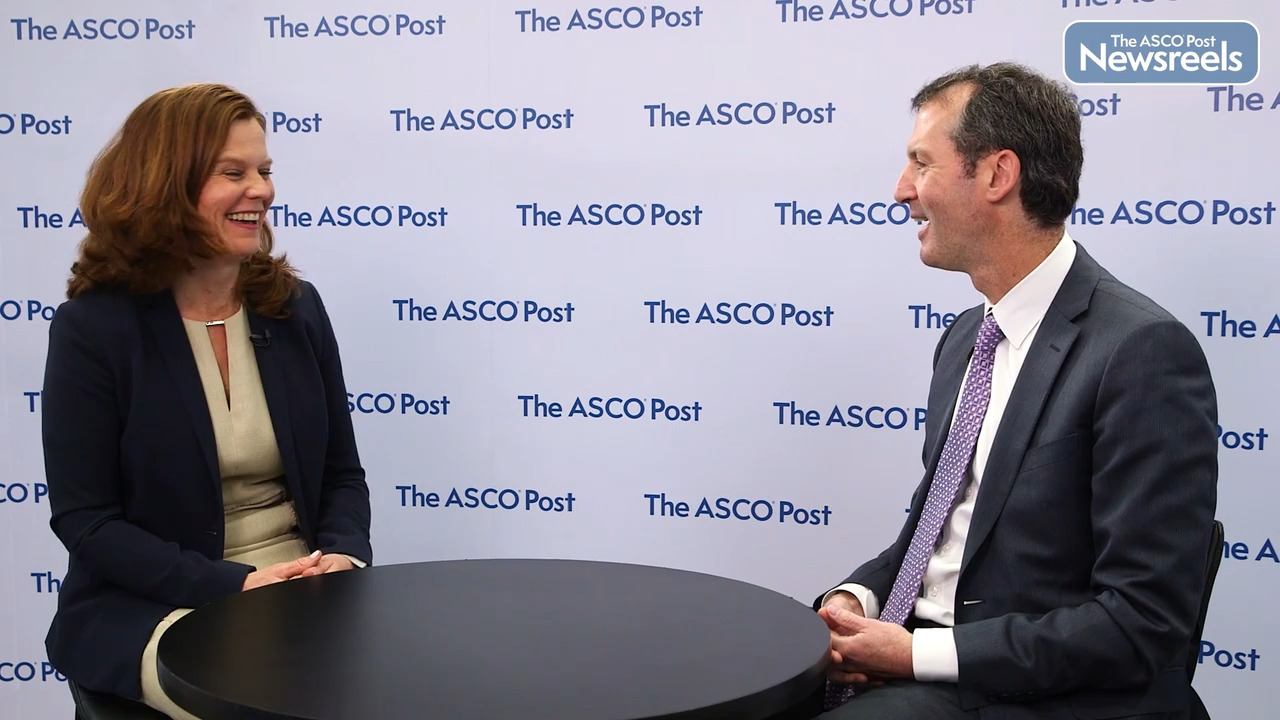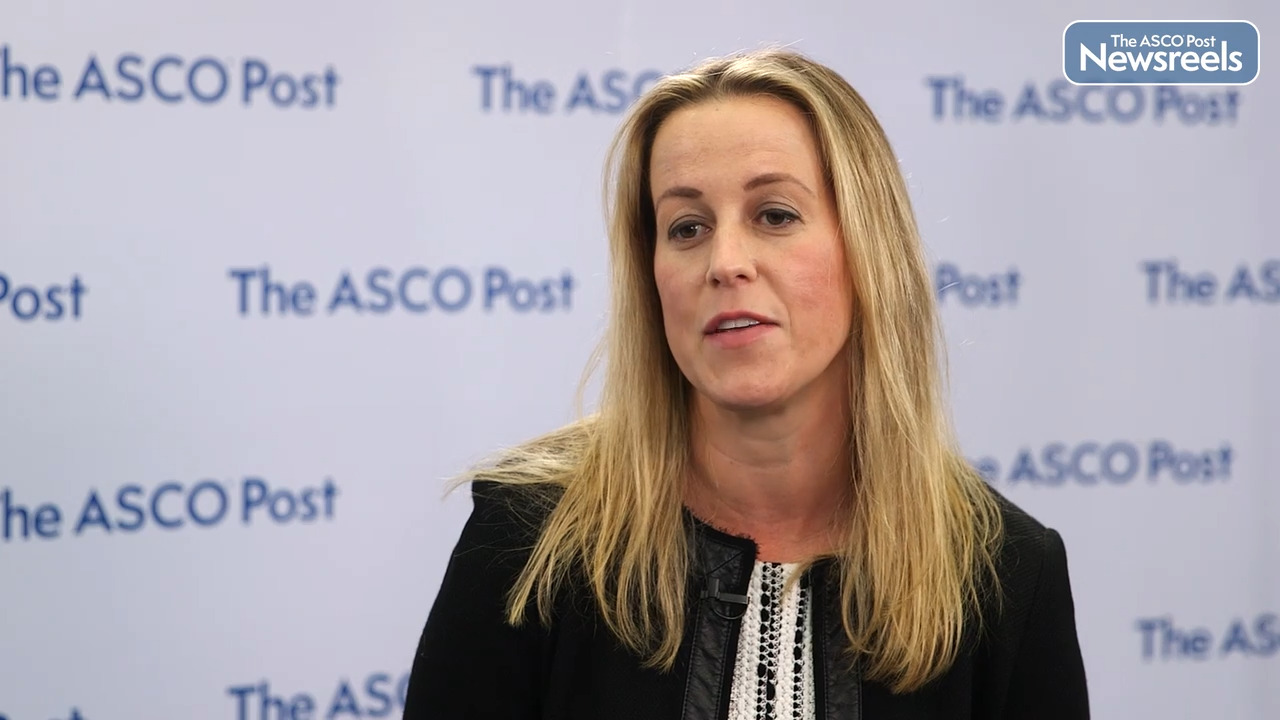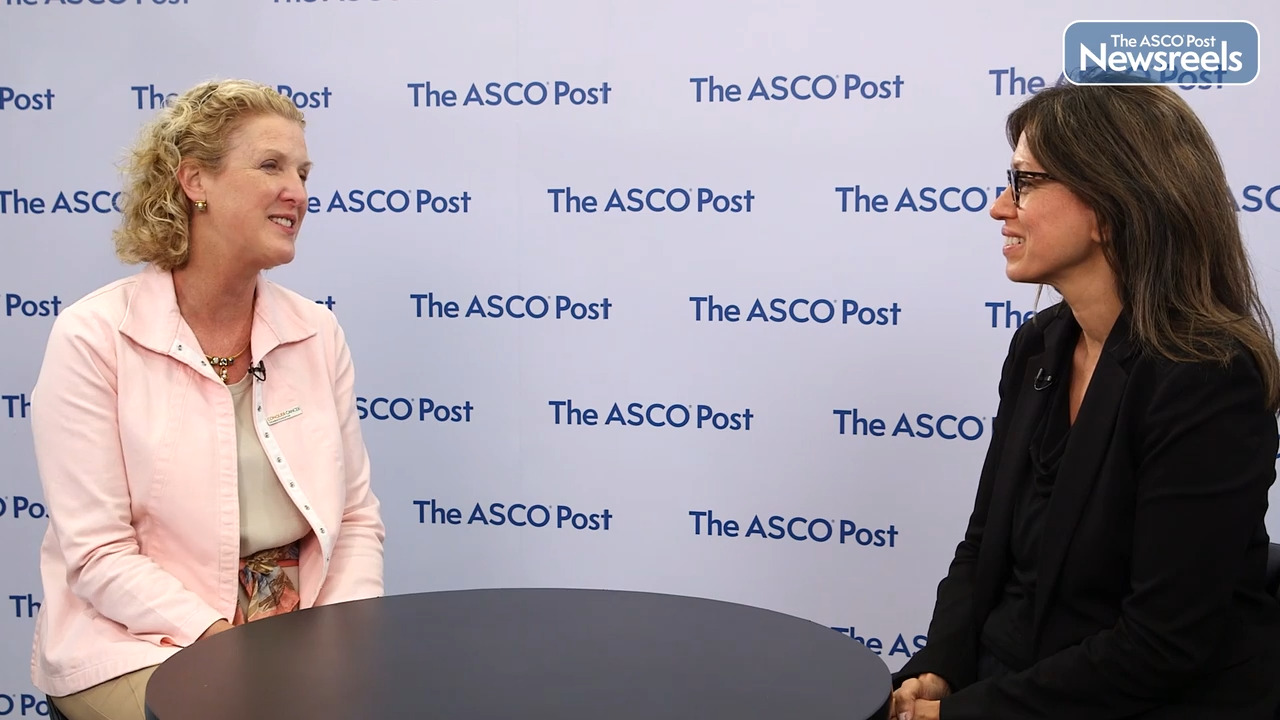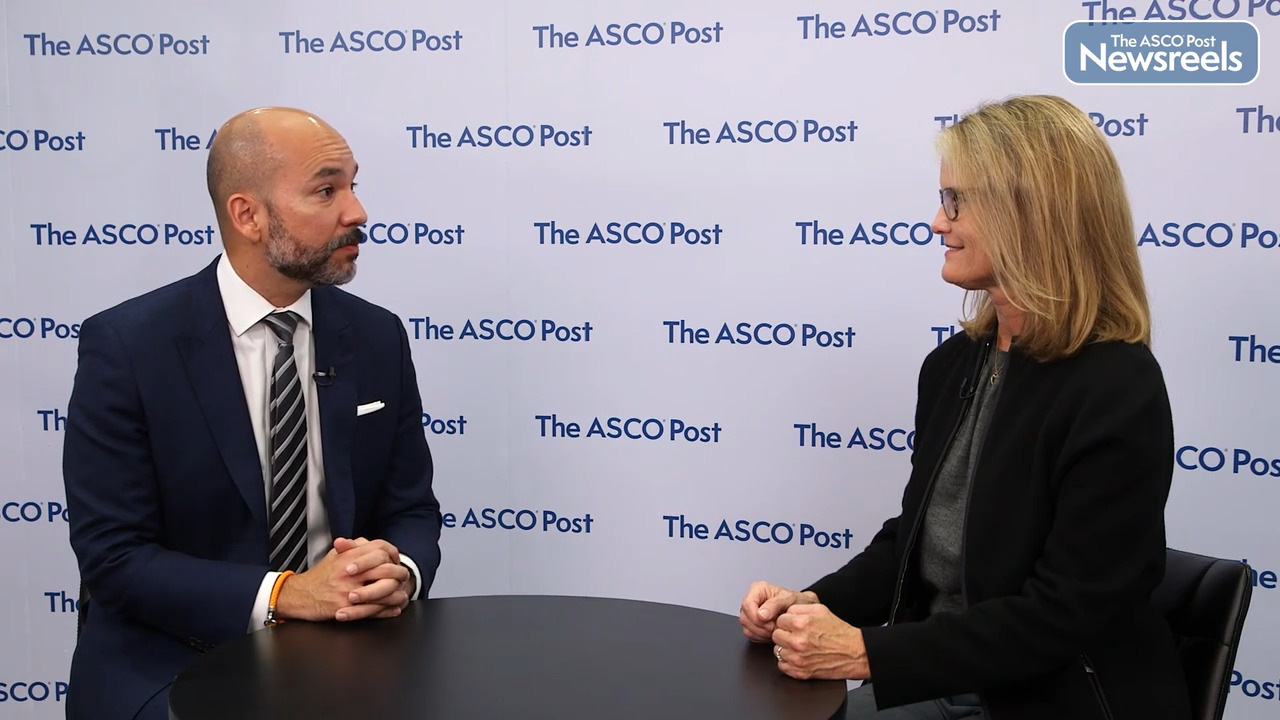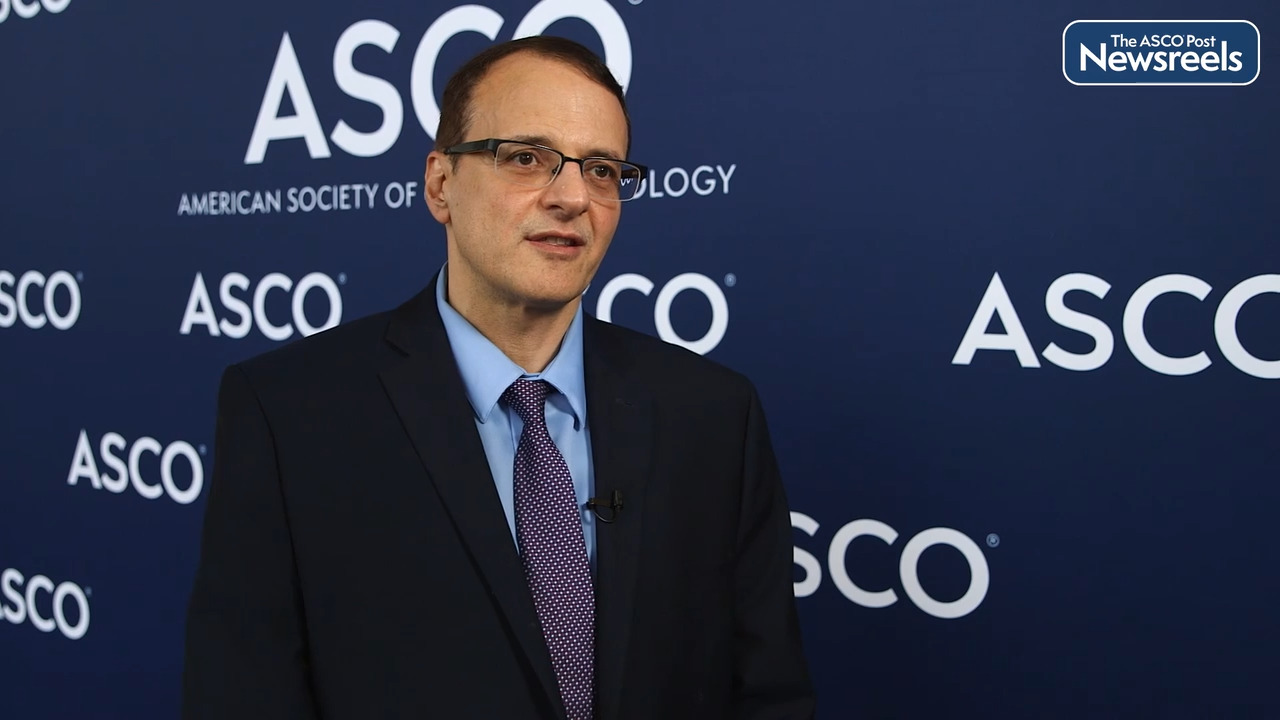Immune Checkpoint Inhibitors for Solid Tumors in Kidney Transplant Recipients With Maintained Immunosuppression
In an Australian phase I study reported in The Lancet Oncology, Carroll et al found that maintaining baseline immunosuppression in kidney transplant recipients receiving immune checkpoint inhibitor treatment for advanced solid tumors did not appear to increase the risk of irretrievable allograft...
Michael Dickinson, MBBS, on DLBCL: Phase II Expansion Results on Glofitamab
Michael Dickinson, MBBS, of the Peter MacCallum Cancer Centre, the Royal Melbourne Hospital, and The University of Melbourne, discusses new data, which showed that fixed-duration glofitamab induces durable complete remissions with a favorable safety profile in patients with or refractory diffuse large B-cell lymphoma and two or more prior therapies, including exposure to CAR T cells (Abstract 7500).
EAU22: ctDNA May Help to Predict Response to Atezolizumab in Patients With Bladder Cancer
Researchers who treated a group of patients with bladder cancer with the immunotherapy atezolizumab after they had undergone surgery have found that patients whose blood contained circulating tumor DNA (ctDNA) responded very well to the treatment. The study was presented at the European Association ...
Bispecific Antibody Mosunetuzumab in Relapsed or Refractory Follicular Lymphoma
In a phase II study reported in The Lancet Oncology, L. Elizabeth Budde, MD, PhD, and colleagues found that mosunetuzumab—a CD20 × CD3 T-cell–engaging bispecific antibody that redirects T cells to eliminate malignant B cells—produced a high rate of complete response in patients with relapsed or...
CAR T-Cell Therapy Gave Me Back a High-Quality Life
A radiologist by training, I knew the minute I saw the results from my chest x-ray that I had multiple myeloma. In 2015, I was semiretired and had just taken up the game of golf. After making a big swing at the ball, I instantly felt pain in my ribs and thought I had either pulled an intercostal...
Does Tumor Mutational Burden Influence Response to PD-1/PD-L1 Inhibitors Among Patients With Advanced NSCLC?
In a retrospective cohort study reported in JAMA Oncology, Ricciuti et al found that patients with advanced non–small cell lung cancer (NSCLC) with higher tumor mutational burden (TMB) had better outcomes with PD-1/PD-L1 inhibitor treatment vs those with lower TMB across thresholds of PD-L1...
Addition of Atezolizumab to Neoadjuvant Anti-HER2 Therapy and Chemotherapy in HER2-Positive Breast Cancer: IMpassion050
As reported in the Journal of Clinical Oncology by Jens Huober, MD, and colleagues, the phase III IMpassion050 trial showed no significant improvement in pathologic complete response rate with the addition of atezolizumab to neoadjuvant pertuzumab/trastuzumab and chemotherapy in patients with...
Trastuzumab and Nivolumab Plus Either Ipilimumab or FOLFOX as First-Line Treatment for HER2-Positive Advanced Esophagogastric Adenocarcinoma
As reported in JAMA Oncology by Stein et al, the German phase II INTEGA trial showed improved survival with the addition of modified FOLFOX6 (fluorouracil, leucovorin, oxaliplatin) vs the addition of ipilimumab to trastuzumab/nivolumab in the first-line treatment of patients with advanced or...
Lisocabtagene Maraleucel as Second-Line Treatment for Relapsed or Refractory Large B-Cell Lymphoma: TRANSFORM Trial
As reported in The Lancet by Manali Kamdar, MD, and colleagues, an interim analysis of the phase III TRANSFORM trial has shown significantly improved event-free survival with second-line lisocabtagene maraleucel vs standard-of-care salvage immunochemotherapy followed by autologous hematopoietic...
Chiara Cremolini, MD, PhD, Comments on Findings From the PARADIGM Trial
The invited discussant of PARADIGM, Chiara Cremolini, MD, PhD, Professor of Medical Oncology at the University of Pisa, Italy, said the findings prospectively confirm the superior benefit of FOLFOX (fluorouracil, leucovorin, oxaliplatin) paired with panitumumab rather than bevacizumab in RAS...
In Metastatic RAS Wild-Type Left-Sided Colorectal Cancer, Panitumumab Proves Superior to Bevacizumab
The preferred targeted therapy for left-sided RAS wild-type metastatic colorectal cancer, in combination with standard chemotherapy, is panitumumab, not bevacizumab, based on a head-to-head comparison in the phase III PARADIGM trial. Panitumumab plus chemotherapy yielded the longest overall...
Study Finds COVID-19 Vaccines Are Safe for Patients Treated With Immune Checkpoint Inhibitors for Lung Cancer
Patients with cancer have received priority status to receive COVID-19 vaccinations, but limited data are available regarding the safety and efficacy of the vaccines for patients treated with immune checkpoint inhibitors for lung cancer. Now, a new study published by Hibino et al in the Journal of...
Addition of Trastuzumab/Pertuzumab to Perioperative FLOT Chemotherapy in HER2-Positive Esophagogastric Adenocarcinoma
In the German phase II PETRARCA trial of the AIO EGA Study Group, reported in the Journal of Clinical Oncology, Hofheinz et al found that the addition of trastuzumab and pertuzumab to perioperative FLOT (fluorouracil, leucovorin, oxaliplatin, and docetaxel) improved both the pathologic complete...
Role of Combined Positive Score With Treatment Outcomes in Recurrent or Metastatic Head and Neck Cancer
In an analysis of the KEYNOTE-048 trial reported in a research letter in JAMA Oncology, Yu et al identified outcomes with pembrolizumab alone or combined with chemotherapy vs cetuximab plus chemotherapy in patients with recurrent or metastatic head and neck squamous cell carcinoma with a low or...
FDA Approves Lisocabtagene Maraleucel for the Second-Line Treatment of Large B-Cell Lymphoma
On June 24, the U.S. Food and Drug Administration (FDA) approved the chimeric antigen receptor (CAR) T-cell therapy lisocabtagene maraleucel (Breyanzi) for adult patients with large B-cell lymphoma (LBCL) who have disease refractory to first-line chemoimmunotherapy or relapse within 12 months of...
Immunotherapy Has Given Me Back My Life
Hearing the words “You have cancer” is a devastating blow, especially when the biggest health issues you’ve had to contend with over more than 6 decades are common colds and knee and hip replacements. But in 2017, the symptoms I thought were from a lingering summer cold drove me to seek medical...
Nivolumab/Cabozantinib vs Sunitinib in First-Line Treatment for Advanced RCC: Overall Survival Analysis of CheckMate 9ER Trial
As reported in The Lancet Oncology by Robert J. Motzer, MD, and colleagues, the protocol-defined final overall survival analysis of the phase III CheckMate 9ER trial showed a significant benefit with nivolumab/cabozantinib vs sunitinib in previously untreated patients with advanced renal cell...
Expert Point of View: Thomas Seufferlein, MD
Thomas Seufferlein, MD, Professor of Medicine at Ulm University Hospital in Germany, found the data from the NOTABLE trial1 encouraging and “clinically interesting.” However, he suggested the study’s design did not allow the EGFR inhibitor to be optimally tested. The NOTABLE trial is based on a...
NOTABLE Trial: Survival in Pancreatic KRAS Wild-Type Cancer Improved With Addition of Nimotuzumab to Gemcitabine
In patients with locally advanced or metastatic pancreatic cancer and KRAS wild-type tumors, novel treatment with the monoclonal antibody nimotuzumab, which targets the epidermal growth factor receptor (EGFR), plus gemcitabine significantly improved overall survival and other outcomes over...
Expert Point of View: Debu Tripathy, MD
Debu Tripathy, MD, Professor and Chair of Breast Medical Oncology at The University of Texas MD Anderson Cancer Center, Houston, shared his thoughts on TROPiCS-02 with The ASCO Post. He said the study is important because it addresses the needs of “a population with limited options, whose...
TROPiCS-02 Sacituzumab Govitecan Effective in Hormone Receptor–Positive, HER2-Negative Metastatic Breast Cancer
For advanced breast cancer that is hormone receptor–positive and HER2-negative, sacituzumab govitecan-hziy significantly reduced the risk of disease progression by 34% over physician’s choice of treatment, based on the results of the phase III TROPiCS-02 trial.1 The heavily pretreated patients in...
Expert Point of View: Kimmie Ng, MD, MPH
The study’s invited discussant was Kimmie Ng, MD, MPH, Associate Professor of Medicine at Harvard Medical School and Co-Director of the Colon and Rectal Cancer Center at Dana-Farber Cancer Institute, Boston. “Neoadjuvant dostarlimab-gxly for 6 months represents a promising new treatment for...
100% Complete Response Rate in 14 Patients With Rectal Cancer Treated With Neoadjuvant Dostarlimab-gxly
In a study of 18 patients with locally advanced mismatch repair–deficient (dMMR) rectal cancer, 6 months of neoadjuvant treatment with the anti–PD-1 agent dostarlimab-gxly alone led to clinical complete responses in 100% of the study’s first 14 patients.1 These results were presented at the 2022...
Expert Point of View: Patricia LoRusso, DO, PhD
Invited discussant Patricia LoRusso, DO, PhD, of Yale School of Medicine, said to the assembled audience at the 2022 ASCO Annual Meeting: “I see you are as excited about these data as I am,” after the applause ended following Dr. Modi’s presentation. “I want to thank our colleagues for helping to...
DESTINY-Breast04 Trial: T-DXd Significantly Improves Survival in Patients With HER2-Low Metastatic Breast Cancer
The antibody-drug conjugate fam-trastuzumab deruxtecan-nxki (T-DXd) doubled progression-free survival compared with chemotherapy alone in patients with “HER2-low” metastatic breast cancer—ie, patients with low levels of HER2 expression. The agent also extended overall survival for patients with low ...
Expert Point of View: Guru P. Sonpavde, MD
Guru P. Sonpavde, MD, Director of the Bladder Cancer Program at Dana-Farber Cancer Institute and a faculty member of Harvard Medical School, Boston, said these follow-up data from CheckMate 274 provide reassurance that the disease-free survival benefit is maintained with adjuvant nivolumab. “We...
CheckMate 274: Adjuvant Immunotherapy Improves Disease-Free Survival in Metastatic Urothelial Cancer
Adjuvant nivolumab could become the standard of care for patients with metastatic bladder cancer, according to data presented at the American Urological Association (AUA) 2022 Annual Meeting.1 With longer follow-up, the results of the phase III CheckMate 274 trial showed that treatment with the...
Gilberto de Lima Lopes, Jr, MD, MBA, and Oladimeji Akinboro, MD, MPH, on NSCLC: Outcomes of Anti–PD-(L)1 Therapy With or Without Chemotherapy in the First-Line Setting
Gilberto de Lima Lopes, Jr, MD, MBA, of Sylvester Comprehensive Cancer Center at the University of Miami, and Oladimeji Akinboro, MD, MPH, of the U.S. Food and Drug Administration (FDA), discuss a data analysis, which suggests that most subgroups of patients with advanced non–small cell lung cancer with a PD-L1 score of 50% or greater who are receiving FDA-approved chemotherapy/immunotherapy regimens may have overall survival outcomes comparable to or better than immunotherapy-alone regimens (Abstract 9000).
Akihiro Ohba, MD, on Biliary Tract Cancer: New Findings on Fam-Trastuzumab Deruxtecan-nxki
Akihiro Ohba, MD, of Japan’s National Cancer Center Hospital, discusses phase II data from the HERB trial on fam-trastuzumab deruxtecan-nxki, which showed activity in patients with HER2-expressing unresectable or recurrent biliary tract cancer (Abstract 4006).
Postmarketing Ocular Toxicity in U.S. Adults Treated With Daratumumab
In an analysis reported in a research letter in JAMA Oncology, Nguyen et al identified postmarketing cases of ocular toxicity in patients receiving daratumumab in the United States. Daratumumab is a CD38-directed monoclonal antibody that was initially approved in 2015 for the treatment of multiple...
Ann H. Partridge, MD, MPH, and Ian E. Krop, MD, PhD, on Metastatic Breast Cancer: New Early Data on Patritumab Deruxtecan
Ann H. Partridge, MD, MPH, Dana-Farber Cancer Institute, and Ian E. Krop, MD, PhD, of Yale Cancer Center, discuss phase I/II findings on patritumab deruxtecan, a HER3-directed antibody-drug conjugate, in patients with HER3-expressing metastatic breast cancer. A pooled analysis showed antitumor activity in women with HR-positive/HER2-negative and HER2-positive advanced disease, as well as triple-negative breast cancer (Abstract 1002).
Erika Hamilton, MD, on Metastatic Breast Cancer: Safety Follow-up Data on T-DXd vs T-DM1
Erika Hamilton, MD, of Sarah Cannon Research Institute at Tennessee Oncology, discusses phase III data from the DESTINY-Breast03 study, which reinforced the consistent safety profile of fam-trastuzumab deruxtecan-nxki (T-DXd) vs ado-trastuzumab emtansine (T-DM1) in patients with HER2-positive unresectable and/or metastatic breast cancer. The findings also support T-DXd’s risk benefit over that of T-DM1 (Abstract 1000).
Real-World Association Between Smoking History and Overall Survival With First-Line Pembrolizumab in Patients With Advanced NSCLC
In a retrospective cohort study reported in JAMA Network Open, Sanjay Popat, FRCP, PhD, and colleagues found that among patients initiating first-line pembrolizumab for EGFR and ALK wild-type advanced non–small cell lung cancer (NSCLC), ever-smokers had significantly better overall survival vs...
Addition of Atezolizumab to FOLFOXIRI/Bevacizumab for Metastatic Colorectal Cancer
In an Italian phase II trial (AtezoTRIBE) reported in The Lancet Oncology, Antoniotti et al found that the addition of atezolizumab to FOLFOXIRI (fluorouracil, leucovorin, oxaliplatin, irinotecan) and bevacizumab improved progression-free survival in the first-line treatment of patients with...
Longitudinal Liquid Biopsy for Circulating Tumor Cells in Metastatic Renal Cell Carcinoma
In a study reported in the Journal of Clinical Oncology, Bootsma et al found that higher circulating tumor cell (CTC) enumeration trajectory identified through longitudinal liquid biopsy was associated with poorer survival in patients receiving immune checkpoint inhibitor treatment for metastatic...
Lisa A. Carey, MD, and Shanu Modi, MD, on Breast Cancer: Is T-DXd a Potential New Standard of Care for HER2-Low Disease?
Lisa A. Carey, MD, of the University of North Carolina Lineberger Comprehensive Cancer Center, and Shanu Modi, MD, of Memorial Sloan Kettering Cancer Center, discuss the phase III findings from the DESTINY-Breast04 trial, which compared fam-trastuzumab deruxtecan-nxki (T-DXd) vs treatment of physician’s choice (TPC) in patients with HER2-low unresectable and/or metastatic breast cancer. T-DXd is the first HER2-targeted therapy to demonstrate clinically meaningful improvement in progression-free and overall survival compared with TPC in this patient population, regardless of hormone receptor or immunohistochemistry status or prior use of CDK4/6 inhibitors (Abstract LBA3).
Gilberto de Lima Lopes, Jr, MD, MBA, and Karen L. Reckamp, MD, on NSCLC: Overall Survival Results With Ramucirumab Plus Pembrolizumab vs Standard of Care
Gilberto de Lima Lopes, Jr, MD, MBA, of the Sylvester Comprehensive Cancer Center at the University of Miami, and Karen L. Reckamp, MD, of Cedars-Sinai Medical Center, discuss phase II findings from substudy S1800A of the Lung-MAP protocol. The data showed that ramucirumab and pembrolizumab improved overall survival compared with the standard of care for patients with advanced non–small cell lung cancer who were previously treated with immunotherapy and platinum-based chemotherapy (Abstract 9004).
Allogeneic CAR T-Cell Therapy for Relapsed or Refractory T-Cell Lymphoma
Patients with relapsed or refractory T-cell lymphoma have limited treatment options. Chimeric antigen receptor (CAR) T-cell therapy has been challenging in these patients because of the state of their T cells. CTX130 is an allogeneic CAR T-cell therapy targeting CD70 on cancerous T cells, offering...
Ponatinib Plus Blinatumomab for Patients With Philadelphia Chromosome–Positive ALL
The tyrosine kinase inhibitor ponatinib and monoclonal antibody blinatumomab—which targets CD19 on leukemia cells—are highly effective as monotherapies for patients with Philadelphia chromosome–positive (Ph+) acute lymphoblastic leukemia (ALL). The combination of the two therapies may provide an...
MajesTEC-1: Bispecific Antibody Teclistamab for Relapsed or Refractory Multiple Myeloma
In the phase I/II MajesTEC-1 trial presented at the 2022 ASCO Annual Meeting (Abstract 8007) and simultaneously published in The New England Journal of Medicine, Philippe Moreau, MD, and colleagues found that the bispecific antibody teclistamab produced responses in nearly two-thirds of patients...
T-DXd Shows Efficacy Against Active Brain Metastases in HER2-Positive Breast Cancer
In the single-center phase II TUXEDO-1 trial of patients with advanced HER2-positive breast cancer, fam-trastuzumab-deruxtecan-nxki (T-DXd) showed efficacy in patients with active brain metastases, yielding intracranial responses in 73.3% of the population and a median progression-free survival of...
Use of T-DXd in Previously Treated Patients With Advanced HER2-Positive Breast Cancer
On May 4, 2022, fam-trastuzumab deruxtecan-nxki (T-DXd) was granted regular approval for patients with unresectable or metastatic HER2-positive breast cancer who have received a prior anti-HER2–based regimen in the metastatic setting or in the neoadjuvant or adjuvant setting and have developed...
Cemiplimab-rwlc Improves Overall Survival vs Chemotherapy in Recurrent Cervical Cancer After First-Line Platinum-Based Chemotherapy
As reported in The New England Journal of Medicine by Krishnansu S. Tewari, MD, of the Division of Gynecologic Oncology, University of California, Irvine, and colleagues, the phase III EMPOWER-Cervical1/GOG-3016/ENGOT-cx9 trial has shown improved overall survival with cemiplimab-rwlc vs...
BEGONIA Trial Reports Activity With Datopotamab Deruxtecan Plus Durvalumab in Triple-Negative Breast Cancer
Preliminary results of the basket BEGONIA trial showed that the antibody-drug conjugate datopotamab deruxtecan (Dato-DXd), paired with the immune checkpoint inhibitor durvalumab, has strong activity in advanced or metastatic triple-negative breast cancer among patients not biomarker-selected for...
DESTINY-Breast03: Should Trastuzumab Deruxtecan Be the Preferred Second-Line Regimen in HER2-Positive Metastatic Breast Cancer?
Since the introduction of trastuzumab in the late 1990s, overall survival for patients with HER2-positive metastatic breast cancer has substantially improved. Median overall survival in the pivotal first-line trial was only 20.3 months in the chemotherapy arm, and 25.1 months in the...
T-DXd Improves Progression-Free Survival vs T-DM1 in Metastatic HER2-Positive Breast Cancer
As reported in The New England Journal of Medicine by Javier Cortés, MD, PhD, of the International Breast Cancer Center, Barcelona, and colleagues, the phase III DESTINY-Breast03 trial has shown significantly prolonged progression-free survival with fam-trastuzumab deruxtecan-nxki (T-DXd) vs...
Ciltacabtagene Autoleucel in Relapsed or Refractory Multiple Myeloma: 2-Year Follow-up of CARTITUDE-1 Trial
In an analysis presented at the 2022 ASCO Annual Meeting (Abstract 8028) and simultaneously reported in the Journal of Clinical Oncology, Thomas Martin, MD, and colleagues provided data from the 2-year follow-up of the pivotal CARTITUDE-1 trial of the anti–B-cell maturation agent (BCMA) chimeric...
Incidence of Major Adverse Cardiac Events in Patients Receiving Immune Checkpoint Inhibitors
In a study presented at the 2022 ASCO Annual Meeting (Abstract 2508) and simultaneously reported in the Journal of Clinical Oncology, Naqash et al identified the incidence of major adverse cardiac events among patients receiving immune checkpoint inhibitors for cancer as captured in the serious...
Brexucabtagene Autoleucel in Relapsed or Refractory Mantle Cell Lymphoma: 3-Year Follow-up of ZUMA-2 Trial
In an analysis presented at the 2022 ASCO Annual Meeting (Abstract 7518) and simultaneously reported in the Journal of Clinical Oncology, Michael Wang, MD, and colleagues provided data from the 3-year follow-up of the pivotal ZUMA-2 trial of the chimeric antigen receptor (CAR) T-cell therapy...
Nabil F. Saba, MD, on Head and Neck Squamous Cell Carcinoma: Phase II Findings on Pembrolizumab and Cabozantinib
Nabil F. Saba, MD, of Winship Cancer Institute of Emory University, discusses new data from a trial of pembrolizumab and cabozantinib in patients with recurrent metastatic head and neck squamous cell carcinoma. The study met its primary endpoint of overall response rate. The regimen was well tolerated and exhibited encouraging clinical activity in this patient population (Abstract 6008).
